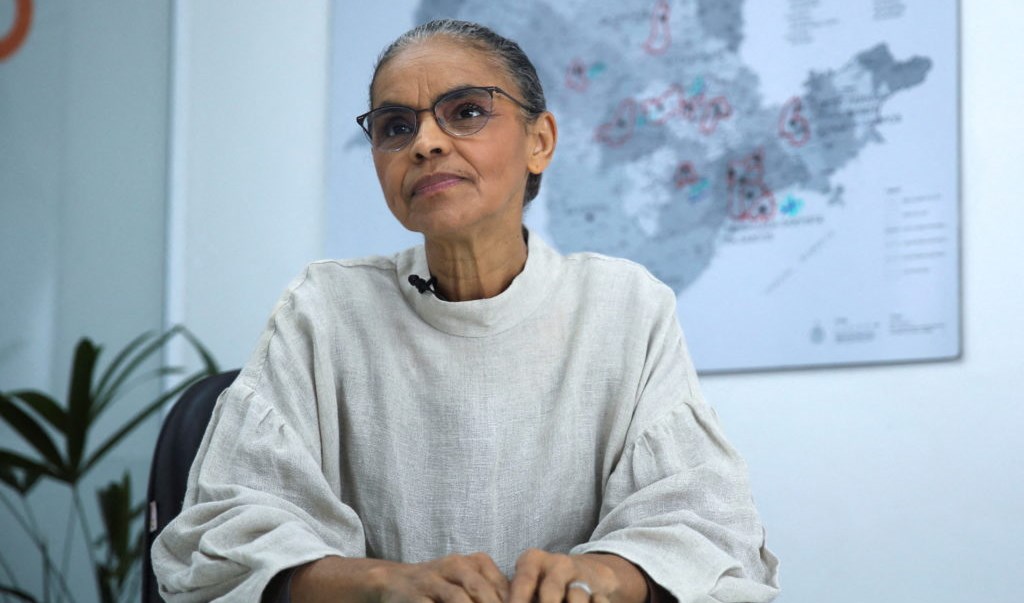Bolsonaro must be investigated for genocide: Brazil Env. Minister
Armed police and environmental protection agents are due to launch the first operation by plane and helicopter to remove thousands of miners in Brazil’s Yanomami Indigenous territory.
-

Marina Silva during an interview with Reuters in Brazil on Nov. 3, 2022 (Reuters)
Brazil’s Environment Minister, Marina Silva, has prepared an operation to capture and remove illegal gold miners from Indigenous land, and pointed fingers at former president Jair Bolsonaro, requesting that he be investigated for genocide.
Armed police and environmental protection agents are due to launch the first operation by plane and helicopter to remove thousands of miners in Brazil’s Yanomami Indigenous territory, as the miners are responsible for contaminating Amazonian rivers and exploiting the rainforest.
An emergency was declared by President Luiz Inácio Lula da Silva after photos emerged of emaciated children and elderly people in the region, and after the Sumaúma news platform announced that 570 Yanomami infants died from diseases during Bolsonaro’s term that could have prevented - a 29% jump from the previous four years.
The Environment Minister stressed that former president Bolsonaro should be held accountable for these deaths. “I think he should be investigated for committing genocide,” she said, adding “The ministry of justice itself is already forwarding the action.”
Read next: Brazilian Amazon deforestation up 150% during Bolsonaro's last month
Ibama, the Brazilian environment protection agency, will be leading the removal of miners, but the police and military are anticipated to provide assistance, especially since Bolsonaro dissolved the environmental investigations arm of the federal police.
“This all needs to be recovered,” she said, adding: “It’s being recreated now so we’re having to start many things from scratch.”
Human rights over consumerism
Silva served as environment minister from 2003 to 2006, and under Lula's first term her policies led to an 83% decrease in Amazon deforestation, but she said Bolsonaro “annihilated” environmental policies. Lula has already vowed to achieve zero deforestation by 2030 while aiming to protect Brazil's major biomes.
Silva comes from a mix of Brazil’s three main ethnic groups: native indigenous, Portuguese settlers, and enslaved Africans. In her previous years, she worked with Chico Mendes, the environmental activist who was murdered for attempting to protect the Amazon.
On Tuesday, Silva urged rich nations to encourage the sale of sustainable products from Indigenous communities.
Read more: Bolsonaro options to Amazon Yanomami: Forced integration or extinction
Germany and Norway have previously contributed to the Amazon Fund, while the UK is still considering, and although the US has vowed to contribute millions of dollars, it did not follow this with any action. Silva stressed the need to focus not just on health and sustainability but on ethics as well, “It is necessary to value human rights. When someone is consuming something, they shouldn’t have to imagine that they are doing so to the detriment of others, as we are seeing now with the Yanomami.”
Future projects for cultural viability
Resource exploration projects are also a hot point of discussion since they exploit and damage the natural health of Brazil. For example, the state-controlled oil company Petrobras has amped up efforts to drill wells in the Amazon river, which Silva says is a priority conservation area.
Hydroelectric and water diversion projects are not exempt, because costs are starting to trump the benefits. The minister announced that she will be assessing the transfer of water from the São Francisco River and the building of dams on the Tapajós River.
“This is not just about economic viability but social viability, environmental viability and cultural viability,” she expressed as she referred to the past disasters, which were the outcome of the Belo Monte hydroelectric dam in the Amazon.
Energy transition, she emphasized, must be subject to acceleration, because Brazil has "huge potential to distribute green energy." She further spoke of the possibilities of generating green power for other nations that do not carry the same abilities as they do.
Although she acknowledged that a four-year term was not sufficient enough to complete all of the objectives, a base for the transition is necessary to be established in order to also influence the public, especially the 25 million affected living in the Amazon. Silva further stressed that there are better and more positive ways to go around methods to achieve profit.
“It is about convincing people that there is no point in having a profit for 10 years if the cost is to destroy something for the rest of our lives.”
Illegal miners have been invading Yanomami territory for decades, but the intrusions have increased since Bolsonaro entered office in 2019, threatening to enable mining on formerly protected indigenous territories.

 5 Min Read
5 Min Read








